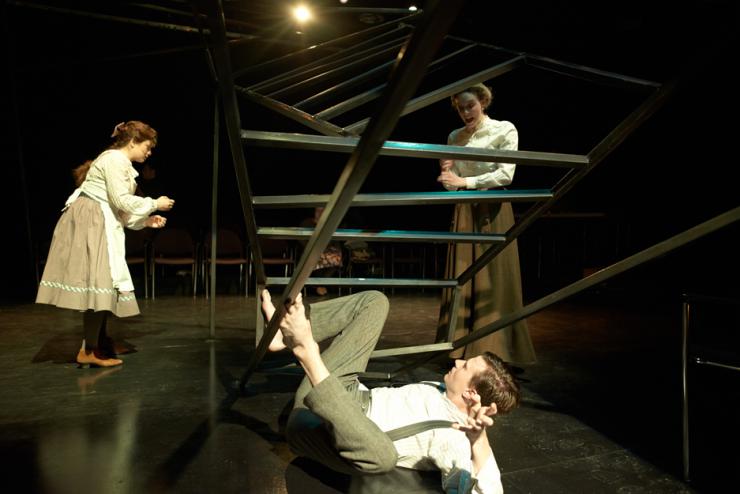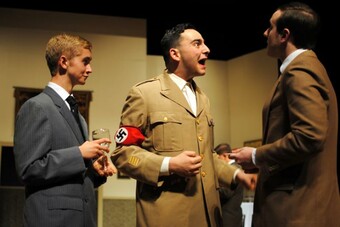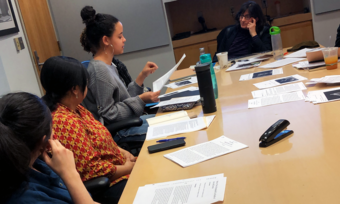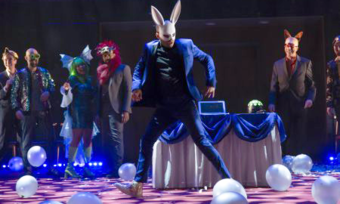University Theater in Boston
The Classical Experimental

For the second chapter of my survey of University theater in greater Boston, I am going to write about a production by a quite new limb of the School of Theater at the College of Fine Arts at Boston University, now entering its sixth season.
The Boston Center for American Performance (hereafter BCAP) is a professional arm of a conservatory-type program with slots for graduate acting students, housed by a university concerned with upholding an academic excellence that is collocated with excellence in the arts. The model is somewhat convoluted to describe in administrative specifics, but not at all uncommon. It is built on the principle that two very appealing canoes for university theater—professional quality productions and the delegation of serious acting jobs to students undergoing conservatory training—are canoes meant to be straddled and linked by some agent institution. BCAP is such an institution, and its recent production of Steven Berkoff's adaptation of Kafka's Metamorphosis was introduced with a long, idealistic manifesto-cum-production note on the aims of the Center:
BCAP has grown into an award-winning gem of an initiative that embraces all four of the School of Theatre's core values: collaboration, artistic excellence developed through rigorous study, a committment to the artistic growth of our community, and a focus on exploring new possibilities for the American Theatre through the development of new work and new approaches to existing work. Indeed, this production exemplifies all four ideals. Director Elaine Vaan Hogue . . . leads an ensemble of School of Theatre students in this modern exploration of Franz Kafka's classic tale of Gregor Samsa, a humble man who wakes one morning to find himself transformed into a giant insect.
Samsa's metamorphosis, of course, is not unrelated to the quasi-esoteric process of artistic development that students in a conservatory program are hoping to undergo, and at times this sort of education makes one feel nearly as insect-like, and at least equally slovenly. Tadashi Suzuki has said that one of the unspoken problems in theater is the transmission of experience from one generation to another, which is a particularly live question for performers. "Since individual skills cannot be passed on to the next generation," he asks, "what about artistic experience?"
So it is fascinating to see the experimental plays of Suzuki's generation, like Berkoff's Metamorphosis, or the Alice in Wonderland of André Gregory's Manhattan Theatre Project, or Heiner Müller's Hamletmachine, given new life half a century later—particularly when they become tools for educating a new generation of artists. What's presented by something like the BCAP Metamorphosis is not just a play, but an important transmission of artistic experience as education. Because we know a great deal about the performance history of these plays, and the degree to which the non-transferable skills of performer and ensemble were meant to buttress the transferable text, their inclusion in twenty-first century curricula becomes important in the history of theater: we are witnessing the old generation's expressions, shaped into established forms, and approached by actors who treat them as such.
What's presented by something like the BCAP Metamorphosis is not just a play, but an important transmission of artistic experience as education.
This is of particular interest with the theater literature in question, which puts so much ideological stock into the power of the living, improvising ensemble, so that faithfulness to the text requires, in its way, a more absolute faithfulness to the ensemble's own experience. If the medium is to be the message, there is little alternative to new inventive practice when the body in space must be the mode of communication, and the original body is not present. The texts of plays from the experimental theater movement would be misrepresented if they were played "straight," for the text almost always indicates curving contours of body and energy that it knows it cannot include. Of course, this is the sort of principle Heiner Müller insists upon when he offers his Hamlet a stage direction like this: "Steps into armor, splits the heads of Marx Lenin Mao with the axe. Snowfall. Ice Age."
Just how to approach re-staging of such stuff; how to teach it to students, or act it if you didn't live through the very particular moment of the theatrical 1960s? Berkoff's Metamorphosis (1969) at least provides a more familiar sense of space and company in its stage directions, which are naturalistic. The problem of transforming an actor into a beetle, however, is not quite a naturalistic problem, and even very detailed description of the sort of thing a person might do to effect it will leave a complex problem of transmission, having to do with parts of the actors' craft that are themselves esoteric enough to beggar description. BCAP's Andy Weyenberg was remarkable as Gregor, his boyish face and contortionist's frame dangling from the metal scaffold setting by Elizabeth Panneton, sweat dripping through his hair and face as a series of sharp insectan movements played on his fingers, toes, and the small spinal vertebrae of the neck.
Mime has always included a resemblance to the circus arts, insisting upon the emotive possibilities of using the body with technical exactitude. It was played with a force by the Samsa family: mother Mrs. Samsa (Molly Jones), father Mr. Samsa (Matt Dray), and sister Greta (Maria DeCotis). Together, the three painted a picture of the lower-middle-class life that came to appear as surreal as Gregor's transformation, especially as they shared invisible meals in accelerated time, opened presents, smoked cigars: things themselves, and especially consumption, took on a sinister quality. A chorus of minor characters, all played by Harrison Bryan with the help of two moderately disturbing masks, in a tour-de-force of brilliant casting: the boarders, the chief clerk, those outside the family had personalities pushed to the clownishly insane.
All of these qualities are related to circus, to the way we watch people perform feats of expertise. There is something incongruous about the metamorphosis of one of the great pieces of existential modern literature into a form for showcasing an actor or ensemble's skill—but it is also a form of ennoblement, a kind of regeneration. What more can we ask of university theater than that it should uphold excellence, and establish it in even the strangest corners of experience? I take it that a work like Metamorphosis speaks of isolation, rebellion, and dissatisfaction with the status quo. And canonization of such literature gives a pedestal to the strange fruits of frustration that the twentieth century has produced, making forms of them from which a new generation can learn. The exuberance of BCAP's translation of this experience ought to be applauded, and sung.









Comments
The article is just the start of the conversation—we want to know what you think about this subject, too! HowlRound is a space for knowledge-sharing, and we welcome spirited, thoughtful, and on-topic dialogue. Find our full comments policy here
I wonder if the same applies to older works?